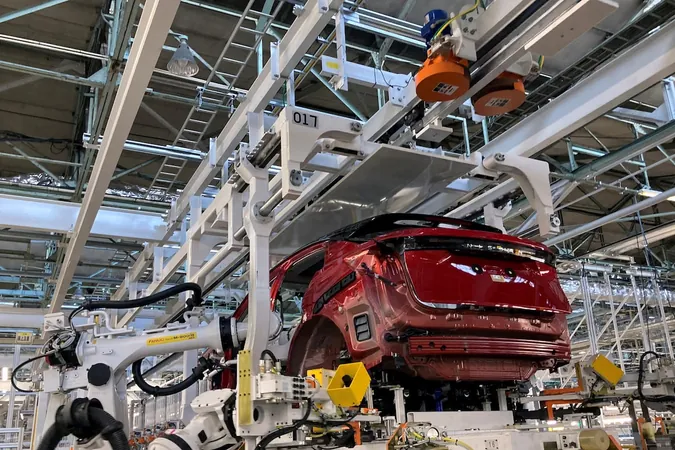
Urgent: Honda and Nissan’s Desperate Merger Talks Reveal a Troubled Auto Industry Landscape
2024-12-20
Author: Jacob
Introduction
In a shocking turn of events, Honda and Nissan, two of Japan's most prominent automakers, have entered into merger discussions amid a rapidly changing automotive market. This development may not be surprising given the ongoing turmoil in the industry, as manufacturers grapple with the relentless rise of Chinese electric vehicle (EV) competitors like BYD and the ever-looming presence of Tesla.
Recent Industry Struggles
Just last month, Volkswagen took the drastic step of announcing plant closures and thousands of layoffs, marking a historical first for the company which has operated for 87 years. Weak demand in Asia coupled with fierce competition from low-cost Chinese brands prompted these cuts. Similarly, Stellantis, the parent company of Chrysler, Jeep, Fiat, and Peugeot, recently shocked investors with an earnings warning, pointing to waning sales and excessive inventories, particularly in a vulnerable U.S. market. The situation proved dire enough to cost CEO Carlos Tavares his job, highlighting the industry’s escalating challenges.
Ford's Setbacks
Ford has also had its share of setbacks this year, scaling back its North American EV production plans. The pivot back to gasoline-powered vehicles, particularly heavy duty trucks, demonstrates the harsh reality of the current market: it's Tesla's world, and everyone else is scrambling to catch up.
The Merger Possibility
Now, Honda and Nissan, ranked as the second and third largest car manufacturers in Japan—behind the unrivaled Toyota—are contemplating a merger that could reshape the automotive landscape dramatically. The prospect of a Honda-Nissan union seems promising on paper, with plans to incorporate Mitsubishi Motors, in which Nissan holds a 24% stake. Together, these brands could form a formidable presence in the market, boasting a combined market cap topping $50 billion and an annual sales figure of around 8 million vehicles.
Concerns Over Strategic Benefits
However, this merger may not yield the expected synergistic benefits. For Nissan, the merger appears to be more about survival than innovation, as the automaker continues to struggle with an unappealing vehicle lineup and a diminishing footprint in the critical North American market. Recent financial announcements from Nissan highlight the company’s precarious situation, including a staggering $2.6 billion cost-cutting strategy that will eliminate 9,000 jobs and reduce global production capacity by 20%. A bleak 85% drop in second-quarter profits due to missed sales targets in the U.S. and China underscores the urgency of Nissan’s situation, with analysts suggesting the company has only 12 to 18 months left to navigate its current challenges.
Honda's Perspective and Market Reaction
On the other hand, Honda’s decision to engage in merger discussions raises eyebrows among its investors. Following reports of the talks, Honda’s stock took a hit, dropping 3% in New York. Meanwhile, shares of Nissan and Mitsubishi surged, indicating a complex reaction to the looming merger.
Previous Collaborations
The potential collaboration has its roots in earlier announcements of a technology-sharing partnership aimed at bolstering both companies against the unyielding competition from China and Tesla. Notably, Honda has already begun investing heavily in EV and battery technology in Canada, committing $15 billion to establish a robust EV ecosystem there, including plans for a battery facility in Alliston, Ontario.
Conclusion
As Honda weighs the risks associated with partnering with a struggling Nissan, the outcome of this merger will greatly impact both companies' futures. In a market defined by rapid shifts and fierce competition, the stakes are high. It remains uncertain whether Honda's gamble on a faltering partner will yield fortunes or lead them to face dire consequences in an already tumultuous landscape. The automotive industry's future is at a critical juncture, and merger talks like these reveal the desperate measures companies are willing to undertake as they strive to adapt to an increasingly competitive reality.









 Brasil (PT)
Brasil (PT)
 Canada (EN)
Canada (EN)
 Chile (ES)
Chile (ES)
 España (ES)
España (ES)
 France (FR)
France (FR)
 Hong Kong (EN)
Hong Kong (EN)
 Italia (IT)
Italia (IT)
 日本 (JA)
日本 (JA)
 Magyarország (HU)
Magyarország (HU)
 Norge (NO)
Norge (NO)
 Polska (PL)
Polska (PL)
 Schweiz (DE)
Schweiz (DE)
 Singapore (EN)
Singapore (EN)
 Sverige (SV)
Sverige (SV)
 Suomi (FI)
Suomi (FI)
 Türkiye (TR)
Türkiye (TR)